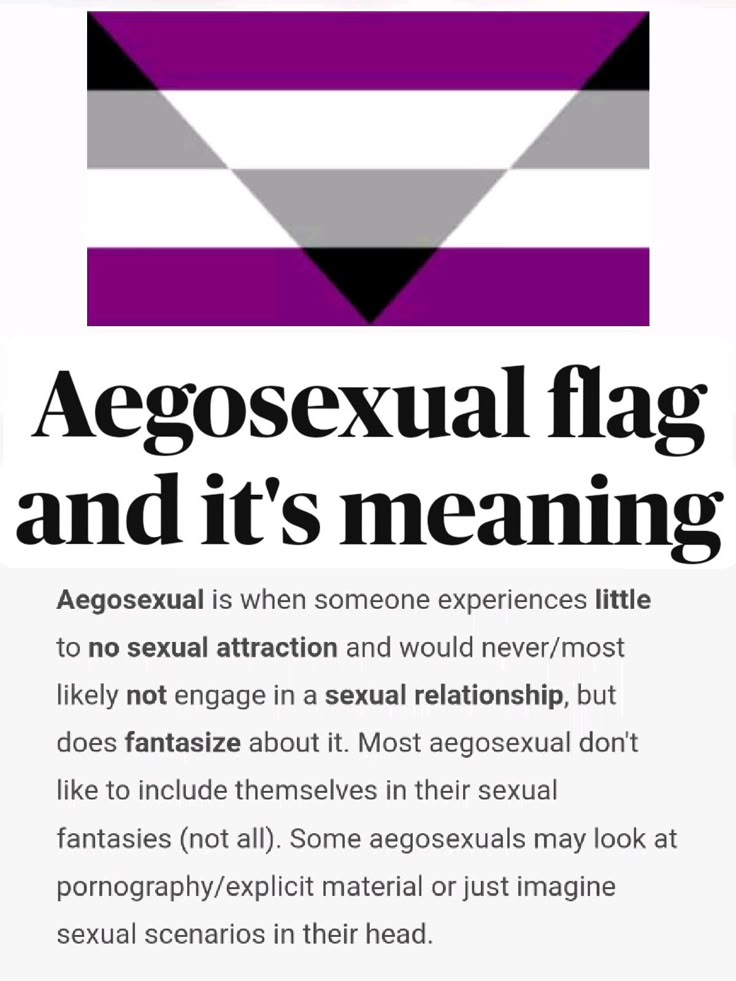Recommendation Info About What Is Aegosexual

Aegosexual
1. What's the Deal with Aegosexuality?
Okay, so you've stumbled upon the word "aegosexual" and you're probably thinking, "What in the world is that?" Don't worry, you're not alone! It's one of those terms that's gaining more visibility as we all become more open to understanding the diverse spectrum of human sexuality. In simple terms, aegosexuality (noun) is a sexual orientation where a person enjoys the idea of sex, but doesn't necessarily want to participate in it or need it to involve them personally. Think of it like enjoying a really good romance novel — you love the story, but you don't need to be the characters to enjoy it.
The core concept here is a disconnect between arousal and desire for partnered sex. An aegosexual person might have vivid sexual fantasies, consume erotica, or even enjoy masturbation, but they aren't driven by a longing to experience those scenarios with another person. It's more about the mental or imaginative aspect of sex than the physical act itself. It's important to distinguish this from asexuality, where a person typically experiences little to no sexual attraction at all. Aegosexual people do experience sexual attraction, it's just that the attraction isn't necessarily directed towards others or a desire for reciprocation.
Another way to think about it is like enjoying a beautiful piece of art. You can appreciate the artist's skill, the composition, and the overall aesthetic without needing to physically interact with the painting. Similarly, an aegosexual person can appreciate the concept of sex, the imagery, and the emotional connection it can represent, without needing to be an active participant. It's a valid and perfectly normal way to experience sexuality, even if it might seem a bit unconventional to those who are used to more traditional definitions of attraction.
Understanding aegosexuality helps broaden our understanding of human sexuality as a whole. It challenges the assumption that sexual attraction always leads to a desire for partnered sex and highlights the importance of individual experience. It is important to remember, that the feelings and definitions can change, which is why it is important to have an open mind to these discussions.

Asexual Identities Aegosexuality YouTube
The Nuances of Aegosexuality
2. Exploring the Spectrum Within
Aegosexuality isn't a monolith. Just like any other sexual orientation, there's a wide spectrum of experiences and preferences within it. Some aegosexual individuals might be completely repulsed by the idea of partnered sex, while others might be open to it under specific circumstances. They might find it enjoyable if they feel a strong emotional connection with their partner, or if they're able to disassociate themselves from the act and view it as a purely physical experience.
It's also important to consider the difference between romantic and sexual attraction. An aegosexual person can be heteroromantic, homoromantic, biromantic, panromantic, or aromantic. They might desire a close, intimate relationship with someone, but without the expectation of sex. Or, they may not experience romantic attraction at all. The possibilities are endless, and that's what makes human relationships so fascinating!
Furthermore, the reasons behind someone identifying as aegosexual can vary greatly. Some people might have experienced trauma that makes them uncomfortable with partnered sex. Others might simply find the idea unappealing or unnecessary for their personal fulfillment. And still others might have always felt this way, without any specific external factors influencing their feelings. What matters most is that they feel comfortable and authentic in their own skin.
Think of it like ordering coffee. Some people love a strong, black espresso, while others prefer a creamy latte with extra foam. There's no right or wrong way to enjoy coffee, and there's no right or wrong way to experience sexuality. The key is to find what works for you and to embrace your own unique preferences. The most important thing is to understand and respect other people's experiences and attractions, even if you don't fully understand them, and to support each other in a journey of self-discovery and acceptance.

Aegosexuality vs. Asexuality
3. Sorting it All Out
Okay, let's tackle a common point of confusion: how does aegosexuality differ from asexuality? While both orientations involve a reduced or absent desire for partnered sex, the core difference lies in the presence of sexual attraction. Asexual individuals generally experience little to no sexual attraction to anyone. Aegosexual individuals, on the other hand, do experience sexual attraction, but it's often detached from a desire for physical interaction with others.
Imagine it like this: asexuality is like not being hungry at all. You simply don't have the desire to eat. Aegosexuality, on the other hand, is like enjoying the idea of food, maybe even watching cooking shows or browsing recipes, but not actually wanting to eat anything yourself. You can appreciate the aesthetic and conceptual aspects of food without needing to consume it.
Another way to think about it is through the lens of fantasy. An asexual person might not have sexual fantasies at all, or if they do, they might not be sexually arousing. An aegosexual person, however, might have vivid and arousing sexual fantasies, but they have no desire to act them out with another person. The fantasy itself is satisfying enough.
It's crucial to remember that these are just broad generalizations, and individual experiences can vary greatly. Some asexual individuals might have some libido, while some aegosexual individuals might occasionally be open to partnered sex under specific circumstances. The most important thing is for each person to identify with the label that feels most authentic to them and to have that identity respected by others. The most important thing, is not to pressure someone to label themselves or to invalidate their identity.

Aegosexual What Is It? Aroace Labels Part 3 LGBTQ+ Info YouTube
Navigating Relationships as an Aegosexual
4. Making it Work
So, how does aegosexuality play out in relationships? The answer, unsurprisingly, is that it depends on the individual and their partner(s). Open communication, honesty, and mutual respect are key to any successful relationship, but they're especially important when one or more partners identify as aegosexual.
An aegosexual person might be perfectly happy in a romantic relationship with someone who doesn't require a lot of physical intimacy. They might prioritize emotional connection, intellectual stimulation, and shared interests over sex. Alternatively, they might be in a relationship with someone who has a higher sex drive, in which case open and honest conversations about boundaries and expectations are crucial.
Some couples might explore alternative forms of intimacy, such as cuddling, kissing, or sensual massage, to maintain a sense of closeness without engaging in sex. Others might agree on an open relationship, where one or both partners are free to pursue sexual relationships outside of the primary relationship. There are no one-size-fits-all solutions, and what works for one couple might not work for another.
Ultimately, the most important thing is for both partners to feel valued, respected, and understood. Aegosexuality doesn't have to be a barrier to a fulfilling relationship. In fact, it can even be an opportunity to explore new and creative ways to connect with each other on a deeper level. The most successful relationships are built on a foundation of trust, communication, and a willingness to adapt and compromise. The key is finding a balance that works for both partners and celebrating each other's unique needs and desires.

Embracing Aegosexuality
5. Finding Peace with Your Identity
Coming to terms with any aspect of your sexuality can be a journey, and identifying as aegosexual is no different. Self-acceptance is paramount. Understanding and embracing your identity can bring a sense of peace and authenticity. Remember, there is absolutely nothing wrong with being aegosexual. It's a valid and normal way to experience attraction, and you are not alone.
Online communities and support groups can be invaluable resources. Connecting with other aegosexual individuals can help you feel less isolated and more understood. You can share your experiences, ask questions, and learn from others who are on a similar journey. These communities can provide a safe and supportive space to explore your identity and build meaningful connections.
Educating yourself is also key. The more you understand about aegosexuality, the better equipped you'll be to explain it to others and advocate for your needs. There are many resources available online, including articles, videos, and personal blogs. Learning about the experiences of other aegosexual individuals can help you feel more confident in your own identity.
Ultimately, embracing aegosexuality is about honoring your own truth. It's about accepting yourself for who you are, with all your unique preferences and desires. It's about celebrating your individuality and finding joy and fulfillment in your own way. By embracing your identity, you can live a more authentic and fulfilling life, and inspire others to do the same.

Aegosexuality What Is It And The History Behind
FAQ
6. Answers to Your Burning Questions
Q: Is aegosexuality a choice?A: No, aegosexuality, like any other sexual orientation, is not a choice. It's a fundamental aspect of a person's identity.
Q: Can aegosexual people have fulfilling relationships?A: Absolutely! Aegosexual people can have fulfilling relationships with anyone, as long as there's open communication and mutual respect.
Q: Is aegosexuality the same as being sex-repulsed?A: Not necessarily. Some aegosexual people might be sex-repulsed, but others might be neutral or even sex-positive. The key is the disconnect between arousal and the desire for partnered sex.
Q: Where can I learn more about aegosexuality?A: Many online resources are available, including AVEN (Asexual Visibility and Education Network) and various LGBTQ+ communities. Search for aegosexuality-specific articles and forums to connect with others and expand your knowledge. Remember to approach all sources with a critical eye and prioritize information from reputable and inclusive sources.